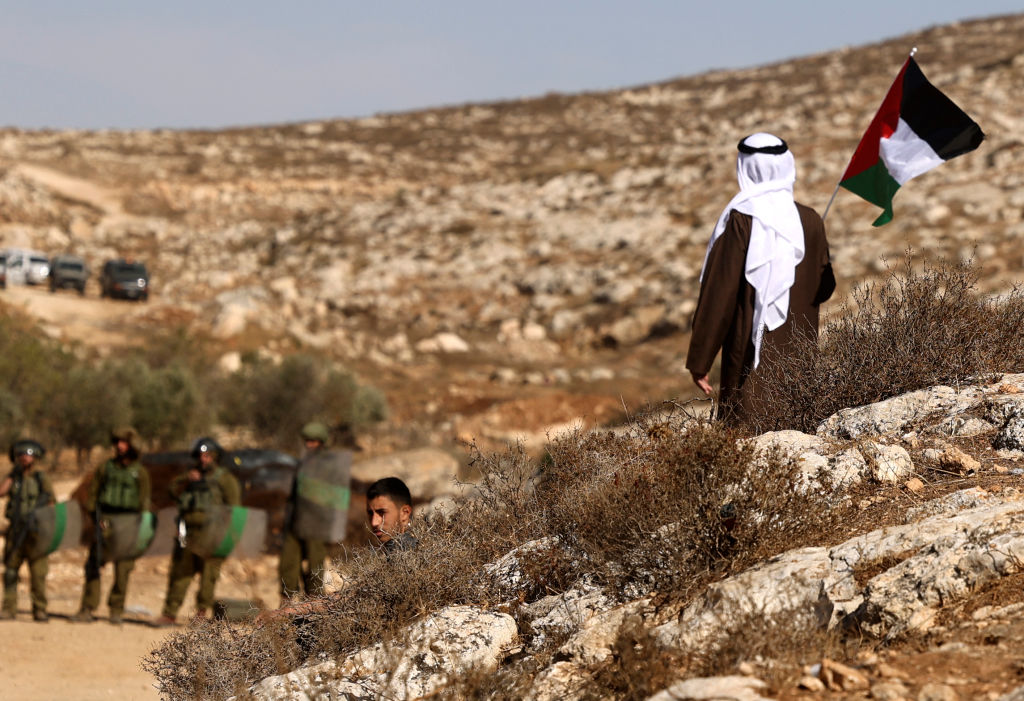Middle East security framework must include Palestinians and Iranians

The Middle East is learning to live without America. While the United States will continue to shape regional security, not least through its advanced weapons systems, its (perceived) retreat from the Middle East has raised serious doubts about its willingness to fulfill its commitments to its allies. Now, local actors are revising their geopolitical strategies, with old enemies pursuing reconciliation and some countries even seeking to create a system of collective security. To deliver regional peace and stability, however, countries will have to overcome even bigger hurdles than they seem to realise.
Middle Eastern leaders’ disillusionment with the US has been growing for more than a decade. Autocratic Arab rulers accuse the US of betraying them during the 2011 Arab Spring uprisings, by aligning with the forces trying to overthrow them. They also blame the US for effectively negotiating the 2015 Iran nuclear deal behind their backs, and for failing to discipline Bashar al-Assad’s murderous regime in Syria.
More recently, Saudi Arabia and the United Arab Emirates were none too happy with America’s non-response to attacks by Yemen’s Houthi rebels on their oil infrastructure. That probably explains, at least partly, why neither country has been willing to meet US President Joe Biden’s requests to boost oil and gas production to contain surging energy prices amid the Ukraine war. Reportedly, they won’t even take his calls.
Instead, Saudi Arabia and the UAE are continuing down the path onto which they stepped at last August’s Baghdad summit, which was convened in an effort to defuse regional tensions. This includes efforts to improve relations with Iran, in hopes of bringing an end to the war in Yemen. The UAE has also re-established diplomatic relations with Assad, whom the US wants to continue treating as a pariah. Assad even visited Abu Dhabi last month—his first official visit to an Arab country since the Syrian civil war began more than a decade ago.
Turkey has similarly adopted a more conciliatory approach towards Assad. Turkey cut all diplomatic ties with Syria in 2011, and long insisted that there could be no peace as long as the ‘terrorist’ leader was in power. But Turkish President Recep Tayyip Erdogan is now seeking an agreement that guarantees that northern Syria will never become an autonomous Kurdish region, and that the millions of Syrian refugees in Turkey can go home.
This is but one facet of a broader Turkish foreign-policy recalibration, spurred by deep regional isolation and severe economic crisis. Despite being a traditional ally of Qatar—the nemesis of the rest of the Gulf states—Turkey recently re-established diplomatic ties with the UAE and engaged in dialogue with Bahrain. Erdogan even seems to be planning to visit Saudi Arabia.
Moreover, Turkey has sought reconciliation with Israel, with Israeli President Isaac Herzog making an official appearance in Ankara last month. This shift reflects Israel’s improving reputation in the Middle East as a legitimate ally, as well as Turkey’s hope to capitalise on the eastern Mediterranean gas bonanza.
Turkey has also pursued a thaw in relations with Egypt, which, like Israel, is a major player in the East Mediterranean Gas Forum, from which Turkey has so far been excluded. With Europe desperately searching for alternatives to Russian gas, Erdogan is eager to facilitate the transfer of Egyptian and Israeli gas across the Mediterranean.
But while this reshuffling of bilateral relationships has important implications for Middle Eastern security, it lacks the transformative potential of an inclusive multilateral structure for ensuring regional peace and security. Such a structure might seem farfetched, given the seeming intractability of the Arab–Israeli conflict, at the heart of which is Israel’s occupation of Palestinian lands.
But the 2020 Abraham Accords—under which the UAE, Bahrain, Morocco and Sudan normalised diplomatic relations with Israel—raised hopes that Arab–Israeli cooperation would be possible. And, at last month’s Negev Summit—hosted by Israel and attended by the foreign ministers of Bahrain, Egypt, Morocco and the UAE, as well as US Secretary of State Antony Blinken—those hopes seemed to be materialising. Participants pledged to expand cooperation to cover energy, environmental and security matters, and to attempt to engage additional countries.
That’s good news for Arab governments, for which the threat of a nuclear-armed Iran, together with the proliferation of jihadist activities, has bolstered the appeal of a regional security agreement. But one group was conspicuously absent from the summit: the Palestinians.
With their hopes of an independent state dwindling, some young, desperate Palestinians have made their dissatisfaction known through a wave of terror attacks against Israeli civilians. This suggests that a grand Arab–Israeli regional initiative that excludes the Palestinians may well prove unsustainable.
As long as Palestinians feel trapped under Israeli occupation and abandoned by their Arab brethren, some will view terrorist acts as their only option for fighting back. Amid escalating violence—which would surely trigger an escalating Israeli response—Arab leaders would face popular pressure to sever ties with Israel.
Furthermore, while they are willing to work with Israel to bolster regional security, Arab countries don’t view the Negev alignment as the only option for dealing with Iran; they’re also pursuing diplomacy—and rightly so. But the Palestinians also deserve peace diplomacy. Instead of attempting to push the Palestinians’ plight onto a back burner, the regional concert of powers seeking to build a more secure Middle East must address it head on. As Jordan’s King Abdullah II recently noted, his country, too, must be involved.
The war in Ukraine has shown that security frameworks that exclude anti–status quo powers are fundamentally fragile. In this sense, the Negev alignment has an even more challenging—and vital—diplomatic mission than its participants seem to realise. In building a post-American regional security structure, they must integrate both the Palestinians and the Iranians—the two revisionist forces that the US failed to pacify during its decades of Middle Eastern hegemony.
